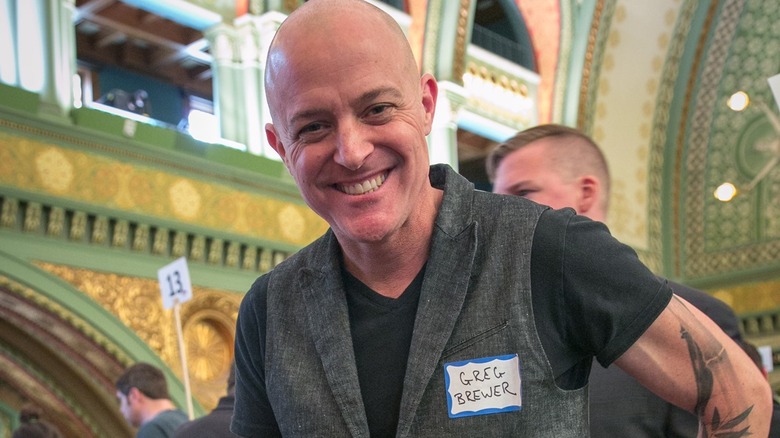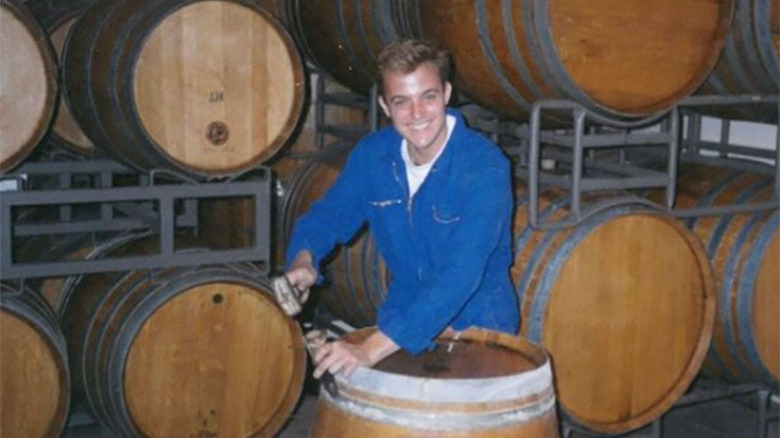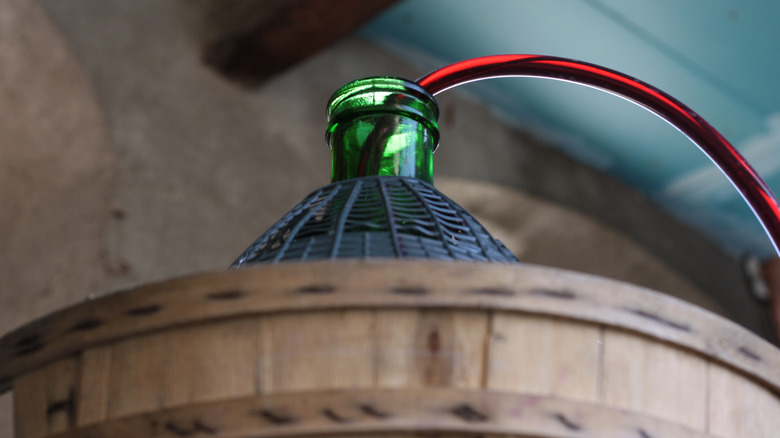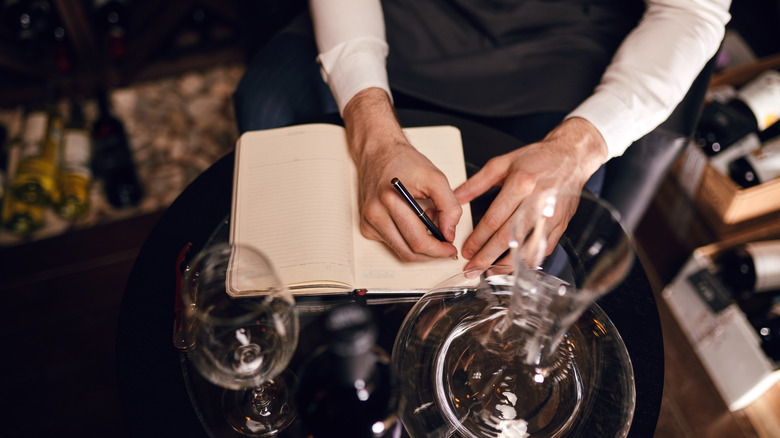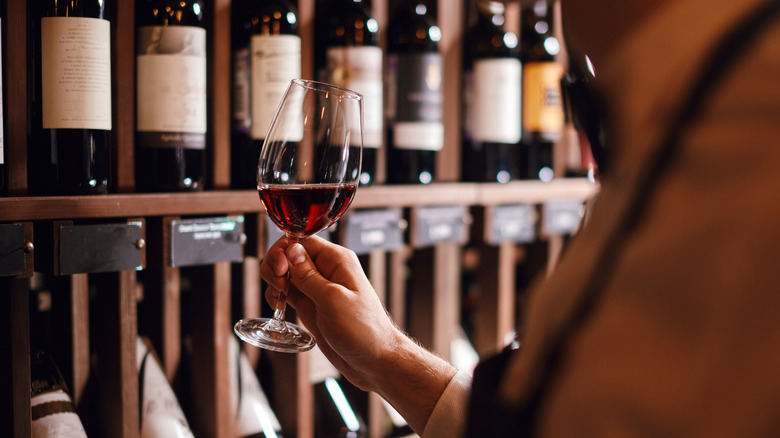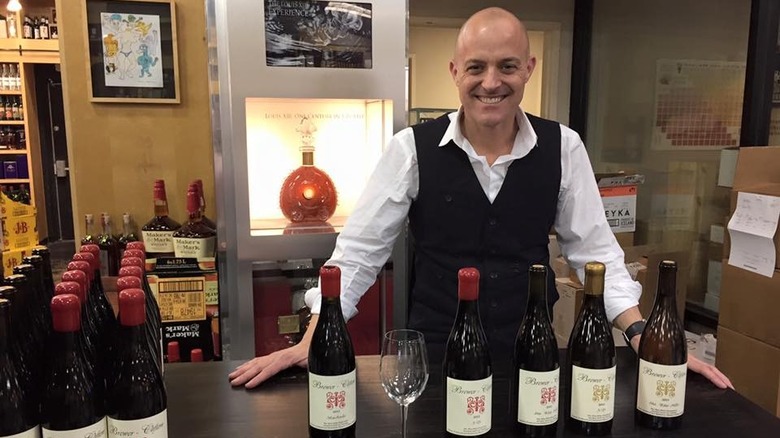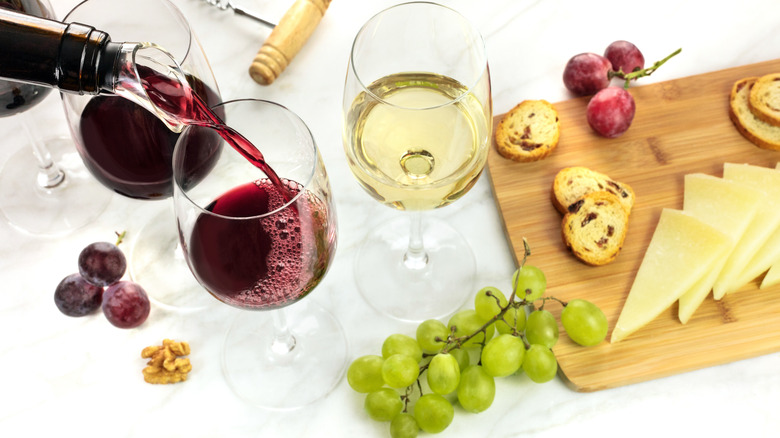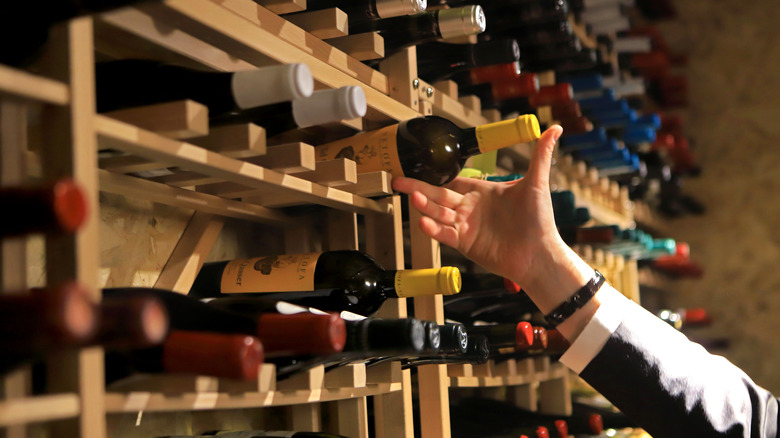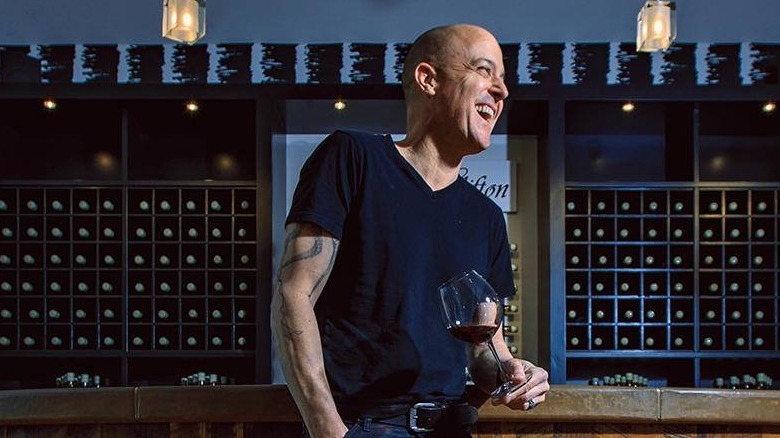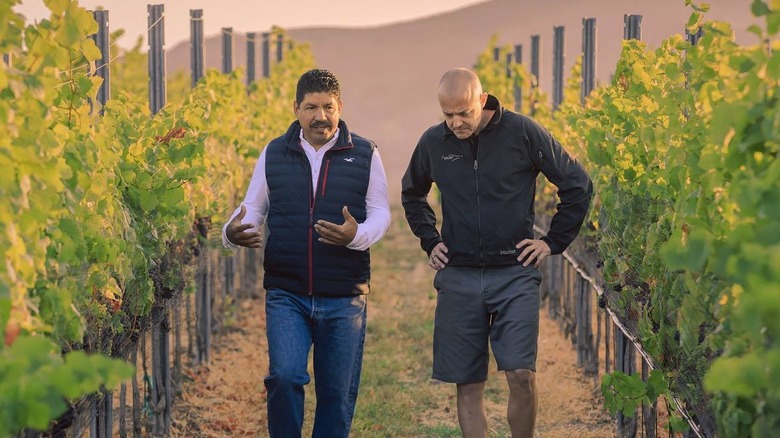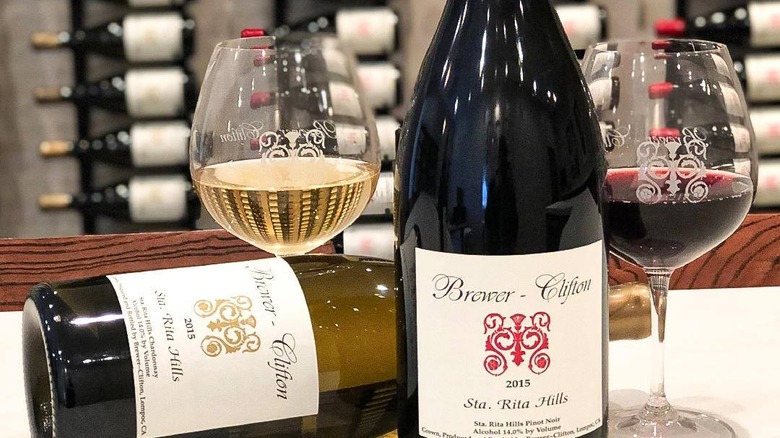Winemaker Greg Brewer Tells Us Everything We Need To Know About Wine - Exclusive Interview
Okay, we know ... one person can't tell us everything there is to know about wine, and certainly not during the course of one pleasant Thursday afternoon chat. But hey, that's not what we said in the headline there, to be fair: the headline says winemaker and co-founder of Brewer-Clifton Wines Greg Brewer would share everything we need to know, we being the wine enthusiast, not the wine expert with the better part of three decades of experience in the business. How did Brewer manage to share so much wine wisdom in one chat?
Easy: Greg Brewer's main takeaway point when it comes to wine, is to just relax and enjoy. If you can find a few varieties of the stuff that satisfy your palate and meet your budget, then you are already set. And if you want to do a deep dive into how the gravel content of soil affects the flavor profile of grapes harvested from a self-rooted half-century-old Chardonnay vine, then you do that, too.
But if Brewer had his way, the entire way we think about wine would shift to make this ancient beverage more approachable, exciting, and everyday enjoyable. Don't take that to mean any lack of respect for wine or a lack of seriousness about the wine industry on Brewer's part: he was, after all, named "Wine Enthusiast's" 2020 Winemaker of the Year. Turns out you can take something seriously without the severity.
Greg Brewer's thoughts on being named 2020 Winemaker of the Year
How did it feel when you were named winemaker of the year in 2020?
I was really flattered, of course personally, but I think where I really found the warmth of the recognition and the pride, so to speak, was for Santa Barbara County as a whole, and specifically, Santa Rita Hills. And I say that not in a vain, not in a faux-humility, acceptance speech thing, not: "Oh gosh, no, it's not about me." I mean, I work really hard. I'm not going to say I don't, I'm not going to lie. At the same time, this is a product of this place. I knew nothing about wine when I started in Santa Barbara 30 plus years ago. And so all that I am as a human being professionally is a result of everyone around me in Santa Barbara, those who have taken me in taught me, inspired me, nurtured me, beat me up, backstabbed, all of it, good, bad, everything in the middle.
And I think that collective is really the celebration of the recognition. And I think it's really highlighting Santa Barbara and Santa Rita Hills because we all earned it together and I really see it that way. I mean, those that made it possible for me to be here in the first place before I was even around and then everyone around me now, and even those that will come, I mean, they should share in it as well because it's all part of this kind of journey, if you will, without sounding cheesy. But I mean, that's kind of how I see it.
What got Greg Brewer into wine in the first place
What first got you involved in the wine industry and when did you realize it was going to become a career?
So I first got involved in May of '91 and I wasn't even planning on getting involved. I was teaching French at UCSB and I happened to open up a newspaper for no reason. And I saw an ad for a tasting room job at a local winery called the Santa Barbara winery. And I thought, "Oh, that'd be fun." Learn about wine, drink wine, eat crackers, give tours. I mean, it sounded like a fun thing to do. And so that's how it started. There was never a plan growing up to do this. And then literally that first afternoon working behind that bar in that very moment, I knew that this would ultimately become my path.
And so it was very immediate. It wasn't a slow warmup. And really in that first day, I saw the synthesis of everything that really resonates with me. The monastic nature of wine production seemed cool, the romance and sex appeal of wine, and that kind of goes without saying, the humility that comes with never being able to do anything twice, every year is a new year. And I think most importantly, the educational aspect, being behind a bar, giving tours, explaining wine to people, quelling their insecurities, calming their fears and concerns and apology that people bring to wine if they feel like they don't know about it. And I thought: "Oh my God, how cool that would be through life .... just for people to drop their shoulders, to be helpful in making people feel better about it so that they, in turn, enjoy it more." And then everyone just enjoys the whole situation more. And so, yeah, I was hooked from the very beginning.
Greg Brewer's advice for people interested in winemaking
What advice do you have for any reader who might be interested in getting into winemaking, whether professionally or as a hobby?
Yeah, I think with winemaking, like any other craft, it's really a question of just want really wanting to do something. If you're really into quilting or really into whatever, like making birdhouses or gardening or whatever, I mean, if you're really into doing something, then your intent is going to be so pure and you're going to bring interest and enthusiasm to whatever you're doing. And I think that's key here, with home brewing, whatever. And so I think that's really it.
And then in the case of production, a lot of it is repetition and hygiene and cleaning, and so specifically for this line of work, much like cooking, if you think about it, that's really the most important thing, is loving what you do, because if that's the case, then you'll really want to do it, and the results will show, whether it be a five-gallon glass container of wine in your garage, or tanks full of it at a job down the road.
How to learn more about wine, according to award-winning winemaker Greg Brewer
What resources do you recommend for someone who wants to learn more about wine, both the beverage and the business?
I mean these days, I mean, not to date myself, but when I started, a book was pretty good. I'm sure online it'd be quicker and faster and easier ... but, for me, there was a book ... It was after my first day of work, I rode my bike to Borders or Barnes & Noble and bought this wine book. And I read it that night, just to kind of get into it, but then reading publications, I think everyone learns in their own way, some learn by kind of experience, some learn by reading, some learn by working somewhere. And so I think it's really being mindful of kind of what makes what educational connections work for said person.
So if it is kind of getting into it gently and maybe reading some things online, subscribing to a magazine or subscribing to it online, whatever, and reading a little bit, be it the service side of it or the production side of it, and then as that interest swells and grows, ideally, then maybe kind of taking it a step further and having more kind of physical and personal interaction with it. And then ultimately on a professional level as well depending on if one is inclined to what I would say is front or back of the house, meaning kind of sales, marketing, restaurant, service or production.
And then ideally the biggest thing that I try to instill in others when I'm teaching at colleges or whatever, masterclass or people that are asking me, is to always be mindful to bridge kind of front and back of the house. That's critical for me. So always to be aware of the entire system, much like a chef who can be very kind of conversant and comfortable on the floor of a dining room. That chef just is not only more valuable to the entity, but I think it benefits both sides. I think if you're cooking and you're in the front and you know what's going on, you bring that back. And then if you can bring your kind of street credibility and vibe and authenticity from the back to the front, it elevates the dining experience for everybody there. Wine's the same way.
How Greg Brewer wishes more people approached wine
What are just a few of the things that, even in this day and age, you wish people understood better about wine?
I think people know more about it than they think. And it's, well, people bring fear to wine. People bring apology to wine. People ask permission about wine. When should I drink this? What should I drink it out of? Should, should, should, should, should. I mean, those are all ... kind of linked with fear and kind of insecurity ultimately. And so I think if people see it for the very primitive beverage that it is, and they feel just calmer with it, and again, they drop their shoulders with it.
I think that's really the biggest way to make leaps and bounds kind of evolutions as far as how people see it and how people understand it. And so if you see why [it's] like a teeter-totter or the relationship of bass and treble in music savory and sweet in cooking, I mean, it's very simplistic, but if people kind of see that tool and actually are comfortable turning that key and translating those concepts into other fields with which they're probably more comfortable or skilled or trained, then it's like: "Oh yeah, I know that language." And then you see the appreciation and the enjoyment of wine usually go through the roof.
Greg Brewer on common misconceptions people have about wine
What are some of the common misconceptions about wine you wish could be finally dispelled?
I mean, there are a lot. That there's a right or wrong way to do things, that's a huge misconception. That there's kind of cut and dry things about anything like: "Oh, you should do this, you shouldn't do that," with regards to production, with regards to the food and wine pairing service, temperature, aging, varieties, regions. And that's just a shame because with wine it's like a YMCA sport.
I mean, every answer is the right answer. It's a hedonistic thing. So if you like them young, great. If you like to drink them older, great. If you want to put ice cubes in it and drink wine out of a coffee mug in the back of the trunk of a car, I mean, that's great, whatever. I mean, it's a hedonistic thing that should give pleasure. And sometimes people, I think, again, going back to the fear element, if it's like: "Oh gosh, I don't know if I should do this," and all of a sudden, you kind of clam up and it's like a fight or flight thing. And then all of a sudden, the enjoyment is diminished so that's one thing for sure.
Greg Brewer's unique take on food and wine pairing
What are some of your favorite ideas for unexpected wine pairing?
So for food and wine pairing ... there's two main ways to think about this. And again, to kind of segue from what we just talked about, if people are too preoccupied by what will work or whatever, then I think you're going to take things down, unfortunately, if there's stress involved, right? Like, [if you're] "I don't know if this will work with this. Oh, I have this recipe, but I've never made lamb with a mint sauce before, but I heard that should go with the red, but I'm freaking out about making this dish, and I don't know," and then all of a sudden, it's not going to be cool. Because [you're] just bummed out and you're stressed out and you're preoccupied. And so my one thing is, eat what you are into and what you're happy making and you like eating and whatever and you have around you, and then drink the same way.
I mean, drink wines that you dig, that you have around you, and everything will work. I mean, if you want those two things to work, it's going to be great. And I'm not talking extremity, like Malbec with like ceviche or ice cream. I'm not talking about weird, crazy, but I mean, in general, 95% of beverage and food kind of coming together, if you like both, then it's going to work by and large. And I think that's the fundamental.
And then from there, I think seeing wine as a condiment, seeing wine like part of a puzzle ... So picture food is like four things, right? Say it's these four things. And then the wine is like the fifth cog. So if it's like: "Oh God, this wine is kind of spicy. It has this tea-like thing ..." oh, cool. We're having this food tonight, that wine will complete that element of the dish that just as well as it could have been spiced or with mint or fruit or whatever. Going into that dish, the wine is that puzzle piece to kind of finish that out.
Greg Brewer's tips for proper wine storage
So what are some of your basic tips for proper wine storage, especially things you see people storing wine incorrectly?
So for proper wine storage, just keeping things cool and keeping things consistently cool. That's really it. I think a lot of us are using kind of technical corks these days so that the bottles don't have to be on their side, but you could always err on the side of having them on their side or upside down just to keep the cork wet, if it is a traditional punch cork that's like a sponge. So sideways or upside down is ideal, cool, away from light and steady. That's the main thing.
If you want to go all in and buy a little wine refrigerator or build a closet in your house or whatever, that's great. But for the reality of most people, the middle of house is good as opposed to walls, certainly avoid south-facing walls, going low is advantageous, so the bottom of a closet and the internal part of an apartment or a house on their side, next to your shoes or your shoes on top or whatever. I mean, it could be as simple as that, but just, kind of consistent, dark, cool, and then sideways or upside down would be like the five main things.
Winemaker Greg Brewer on ending the culture of wine snobbery
How do we end the culture of wine snobbery, yet give the stuff its due respect, something along the lines of what beer has achieved in recent years?
You nailed it because beer is like that. My wife makes wine, and she has a winery tasting room, but she also has a beer side, and you see people roll in and spending a lot of money on craft beers and not sweating anything. I mean, it's not a price. The price isn't slowing it down. I think the beer industry has done a great job in making it like: "Oh come hang out with us, come have us, there's no threat involved." And that's been great and they've done a really good job. And wine, I think because of the history of it and the legacy of it, it's going to take longer to unwind some of that stuff that — again, it intimidates people and it's a fine line. I'm not one to be like, "Oh yeah, it's cool. It's wine, whatever. Just like pour it in a plastic solo cup and party." I mean, if that's what gets you off, that's fine. But I don't, like you said, I don't want to lessen the respect, but it doesn't have to be lame either.
So I think education, kind of just dispelling some of these myths that there are right and wrong to [do] things, because in beer it's not that way. In coffee, tea, certain other things run the risk of doing that as well. I love really heavily dark roasted coffee, and this is my hedonistic pleasure. My coffee-making friends are like, "Dude, I can't believe you drink that," because it eradicates any sense of place or source or whatever, but I'm like, "Well, hey, I like it. So don't bum me out."
And so I think with wine, it's the same thing. I think if we can just kind of explain it and make it available and not intimidating, I think that would be the main thing. And I think there's just a lot of history to unwind and I think it's going to take a lot of time and a lot of presenting wines in different ways and people seeing it in different contexts so that they are more comfortable with it. I think that's going to be critical ... It's a really hard one, as you know, but I think it's just a question of time, largely.
How the wine world is changing, according to Greg Brewer
How have you seen the wine industry and the customer base changing in recent years, and how do you anticipate it will continue to change in the near future?
It's changed a lot. I think when we kind of first really came onto the scene pretty strong, it was a different buying demographic largely. I mean, certainly for our price range of things. And so it was largely baby boomers — we talked about generations — and they were very loyal. They were very influenced by kind of media and scores and different things. And it was like, well, they would stick with their sellers. It was like, "I believe in you, I'm into your wines. I'll take a case of each every year or six bottles of each every year." It was very kind of repeated that way and very, very loyal. And I think younger generations, and as things have kind of gone through time, I mean, there's loyalty — if people dig you, they dig you, and that's fine, but there's a lot more open exploration.
Everything is faster these days with information accessibility. Attention spans I think are a little bit more finite than they might've been before because of technology and information and everything that's so available to everyone all the time. And so I think as a result ... And there's a lot more wineries as well, and there's a lot more opportunities and things to do and seltzers and beers and this and natural wines and blah, blah, blah.
So I think it's more like, "I'll try that." It's more trial, and, I don't want to say surface. I don't want to say it's on a different level, but it's more kind of [a] quick trial of more things than: "Oh my God, I've met you. I found you. I'm going to put a ring on it and I'm going to like settle in with you." I think it's like, "Oh, that's cool. I'll take one or two and maybe I'll come back, maybe I won't." It's a little bit more of that I've found in general these days.
The wine Greg Brewer wishes got more respect
What would be your proverbial desert island wine?
I mean, probably chardonnay, really. I guess there's sparkling wine or champagne, because that's my wife's beverage of choice. I want to keep her happy on the island, but yeah, something that is really intense and singular, but also somewhat neutral. I love all wines ... but chardonnay, it's crazy diverse and everything else, but there's a neutrality to it where I could see having that every day. If you had to pick one thing every day, that would be my go-to, as compared to something that's a little bit more fringy. You know what I mean? It's like having curry or truffle oil or something — after day 97, you might be like, "Whoa, I'm over it," versus like pasta with parmesan or something. You're like, "Okay, that's cool. I'm going to riff on that for a while."
What is one Brewer-Clifton wine you want the readers to try?
Oh wow. I would probably say the Santa Rita Hills Chardonnay. Yeah, our main one. I think it's something, again, going back to generations, like you mentioned, and buying and purchasing trends and whatnot, 20 plus years ago we were selling, vineyard-designated Chardonnay and Pinot at $60, $70, $80 bucks. And we still have a couple of them, but really what I love doing, what's the most rewarding for the past 15 years or so is our Santa Rita Hills blend. Right? It's all of our vineyards woven together. It's a very comprehensive voice of place. It's our systems, it's our hands, it's our farming. And it's a little bit more available.
I mean, it's not a huge wine and it's not cheap at the same time, you know, 30-ish dollars. I mean, it's not crazy expensive. And for me, it's like a calling card. It's a very ambassadorial thing. And I would select that one to open for you or a reader more than the others because Santa Rita Hills Pinot is great, and it's not that it's obvious, but it's a little bit more common.
And Chardonnay, there's so many misconceptions around Chardonnay and it goes back to education where some people say, "Oh, yeah, no, I hate Chardonnay," And I'm like, "Well, first of all, tune down the language choice," hate's a really strong word for a grape, by the way. That's a pretty strong conviction for a little berry. ... And so I love just presenting an opportunity of a very, very important, great variety within an aesthetic that not everyone is as aware of. And so that would be the one I would pick.
Be sure to stop by Brewer-Clifton's tasting room next time you're in southern California, or pick up a bottle of their award-winning wine online.

